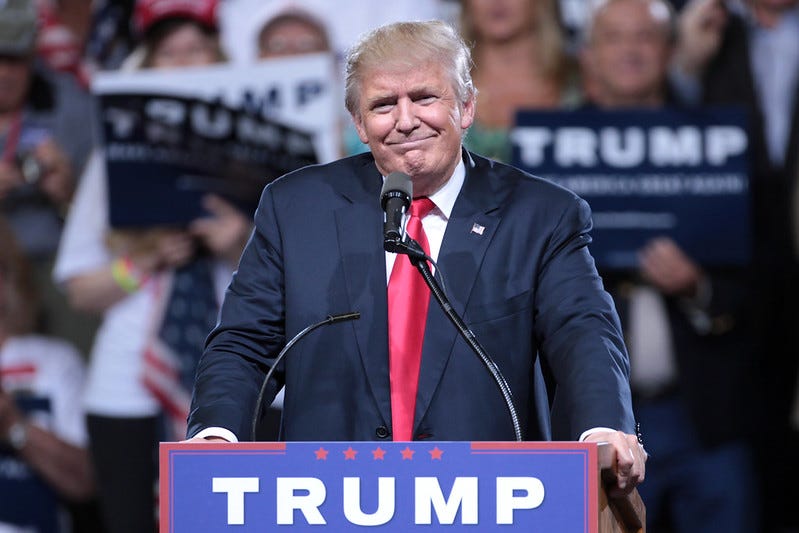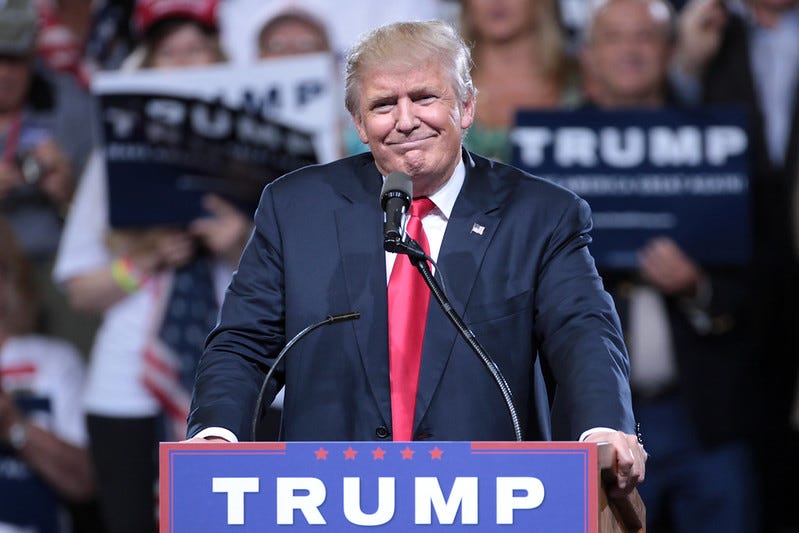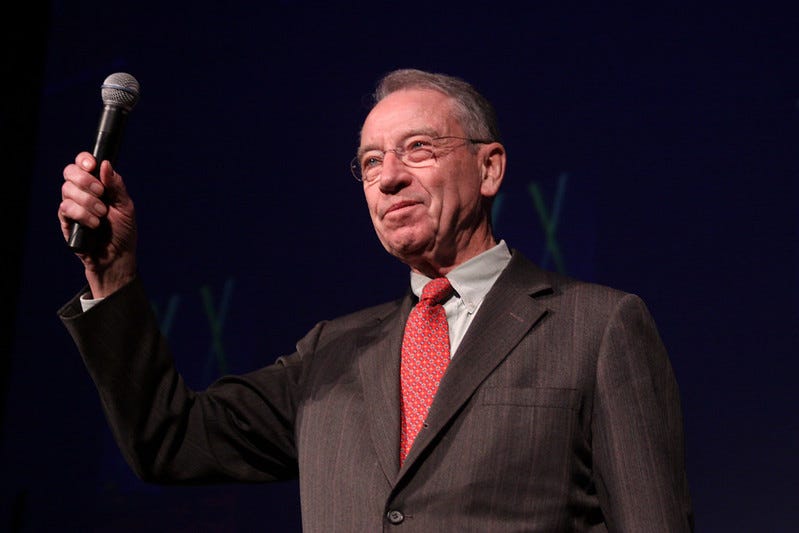Wake Up To Politics - October 13, 2021
Wake Up To Politics: Trump returns to the fore
Good morning! It’s Wednesday, October 13, 2021. Election Day 2024 is 1,119 days away. Election Day 2022 is 391 days away.
Congress is on recess this week, so there’s some time to take a step back and look at a few broader topics. Yesterday, I led the newsletter with an examination of some of the warning signs flaring for Democrats ahead of the 2022 midterms.
Today, I’m turning my focus to the Republican Party, with an eye on a specific dynamic: how former President Donald Trump is maintaining his iron grip on the party apparatus. Let’s dive in...
Trump returns to the fore
When Donald Trump departed Washington, D.C., for a final time almost nine months ago — with “My Way” by Frank Sinatra blaring in the background — his influence had ebbed to an all-time low.
After four years of the political world hanging on his every tweet, suddenly @realDonaldTrump had been banned from the platform that had helped fuel his rise. After four years of bending the Republican Party to his will, even some of his closest GOP allies — from Kevin McCarthy to Lindsey Graham — were beginning to criticize Trump and inch away from him.
Trump left office with his approval ratings lower than at any other point in his presidency: according to Pew Research Center, just 29% of Americans approved of his job performance, reflecting a country shaken by the January 6 Capitol riot that served as his send-off.
But then something interesting happened: Trump disappeared, and it helped him — at least within the GOP. The former president’s power was once thought to be in his ubiquity (he certainly felt that way), but as his tweets and rallies went away, Republicans actually grew fonder. As the January 6 riot shrank into the rearview mirror, GOP lawmakers went from condemning the attack and Trump’s role in it to downplaying both. Trump’s false election claims, once dismissed, have become a litmus test for party loyalty.
In that final Pew poll of his presidency, Trump’s approval rating among Republicans slipped to a personal low of 60%, a 17-point slide from where it stood in August 2020. But in a new Pew poll released last week, 67% of Republicans said they wanted Trump to “continue to be a major national political figure,” up from 57% in the January 2021 poll.
Republicans are welcoming Trump back into the fold, and he’s happily accepting the invitation. A case in point was his return to Iowa this weekend for his first rally in the all-important caucus state since leaving office.
Rallygoers chanted “Trump won!” as the ex-president once again sounded his false claim that the 2020 election had been stolen. And Sen. Chuck Grassley (R-IA), a party elder who had once criticized Trump for those claims, stood by Trump’s side and accepted his endorsement for the senator’s 2022 re-elect.
“If I didn’t accept the endorsement of a person that’s got 91 percent of the Republican voters in Iowa, I wouldn’t be too smart,” Grassley said at the rally, nodding to the fact that his re-embrace of Trump was tied to the fact that GOP voters had already done so.
Indeed, a Des Moines Register poll before the rally found that Trump’s support in Iowa had climbed to new heights: 53% of Iowans now have a favorable view of him, more than ever did when he was president. As Grassley noted, 91% of Iowa Republicans expressed a favorable view of Trump — notably more than the 81% of Republicans with a favorable view of Grassley, who is the longest-serving senator in the state’s history.
As Trump has returned to the fore, so has a re-litigation of January 6. Trump’s return to the political arena has coincided with a series of investigative moves by the House committee probing the Capitol riot.
This week, a group of former Trump aides has been ordered to appear before the panel for depositions to testify on Trump’s role in the lead-up to January 6. The former president has directed his aides to ignore the subpoenas; if they follow his instructions, a legal battle will ensue testing whether a former president can invoke executive privilege, as Trump has attempted to do.
At the same time, more revelations are emerging about Trump’s final days in office, from the memo showing how lawyer John Eastman sought to persuade then-Vice President Mike Pence to overturn the 2020 election to a Senate Judiciary Committee report outlining Trump’s pressure on the Justice Department to challenge the results.
A central question hangs in the background of all of Trump’s activity — and the Republican response to it: will he run for president again in 2024, possibly pulling off a feat not seen since the days of Grover Cleveland?
According to the Washington Post, Trump flirted with announcing a comeback White House bid in August, but was persuaded by advisers to continue biding his time and focus instead on endorsing like-minded candidates in 2022.
But the possibility of a Trump run has left the field of Republican presidential contenders frozen in suspended animation, as figures like Mike Pence, Nikki Haley, and Ron DeSantis try to tiptoe towards potential bids without getting too far ahead of the former president.
While most of the GOP base has fallen in line behind him, some conservatives have begun ringing alarm bells about a Trump comeback bid.
Robert Kagan, a conservative writer, set the political world abuzz in September with his 6,000-word Washington Post op-ed declaring that the U.S. had already entered a rolling “constitutional crisis” fomented by Trump.
Democracy experts have issued similar warnings, pointing to the GOP’s full embrace of Trump’s election lies — the No. 2 House Republican refused to say this weekend that the 2020 race wasn’t stolen — and to state-level attempts to make it easier for election results to be overturned ahead of 2024.
Those warnings have recently been echoed by not one, but two, former Trump aides — both of whom came out with new books earlier this month. Stephanie Grisham, a longtime Trump aide who served as one of his White House press secretaries, told CNN that she was now “terrified of him running for president in 2024,” adding that he would be driven by “revenge” and likely to implement “some pretty draconian policies” if given another term behind the Resolute Desk.
Fiona Hill, who served as Trump’s top Russia adviser before testifying against him during his first impeachment proceedings, minced even fewer words in an interview with Politico. “If he makes a successful return to the presidency in 2024,” Hill opined, “democracy’s done.”
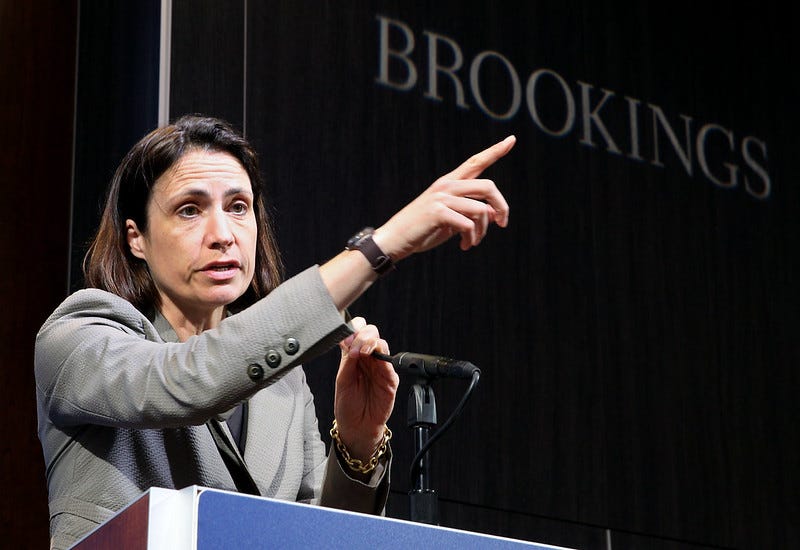
What else you should know
— The House voted along party lines to pass a bill raising the debt ceiling by $480 billion. The measure, which now heads to President Biden’s desk, ensures the U.S. will avoid a default until at least early December.
— The Biden administration announced that it will open its land borders with Canada and Mexico for non-essential travel in November, lifting restrictions that have been in place since March 2020. Foreign nationals will have to be fully vaccinated to cross either border into the U.S.
— Rep. John Yarmuth will retire from Congress next year, he announced. Yarmuth, who has represented Louisville for 15 years, is the only Democratic member of the Kentucky congressional delegation. He is also the chairman of the House Budget Committee; his willingness to leave the post is a sign top Democrats are fearful they will lose their House majority in 2022.
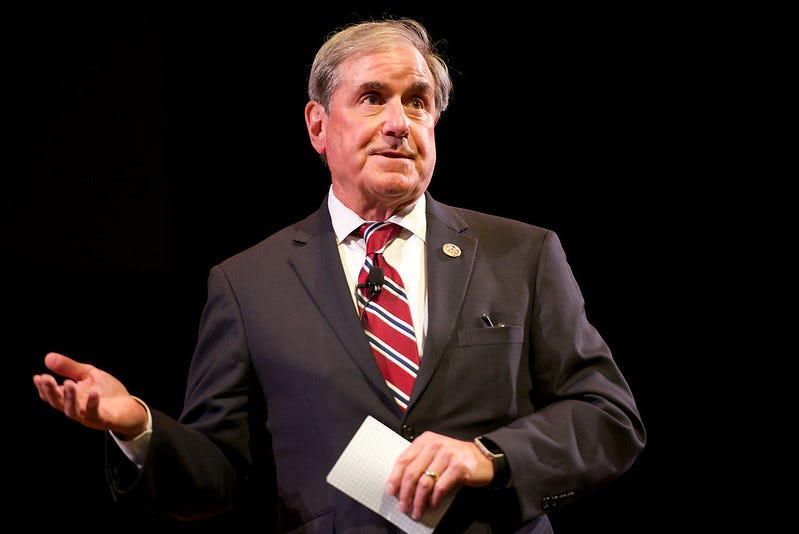
Policy Roundup: Global
By Wake Up To Politics global contributor Miles Hession.
Protests have broken out across Poland in support of the European Union after a Polish Supreme Court decision. Poland’s highest court ruled earlier this week that aspects of the Polish constitution, namely those concerning the Polish judiciary, are supreme over the EU’s laws. The ruling puts Poland at odds with one of the fundamental tenets of the EU: the bloc’s laws and regulations have primacy over any national laws.
The ruling has set up another collision between the bloc and the Polish government and has stoked fears of an impending “Polexit” if the legal differences are irreconcilable. However, protests across the country have shown popular support for remaining in the EU; both Polish and European officials have signaled they hope Poland remains in the bloc.
Early election results in Iraq showed pro-Iranian parties’ losses amid accusations of manipulation. Populist Shi’ite cleric Moqtada al Sadr’s party appeared to have gained seats and was the biggest winner in the election, and will be charged with forming a government. Sadr, who is best known for leading an insurgency against the U.S.-led invasion of Iraq in 2003, has declared staunch opposition to any foreign influence in Iraq and opposes stronger official ties with Iran.
The elections, which were moved forward in response to popular protests in 2019 against corruption, have not altered the balance of power dramatically in the country. With record low turnout, though, and growing claims of manipulation and fraud by pro-Iranian parties which lost seats, Sadr-led negotiations for the formation of a new government look poised to create a political showdown as many voters remain dissatisfied with the status quo.

As prices of natural gas continue to rise in Europe ahead of winter, Russia has signaled a desire for concessions from the EU to assuage shortages. Gas prices have been steadily rising in recent weeks as economies have begun to reopen. As stockpiles have begun to dwindle, European countries are looking towards Russia to fill in the gaps.
Russian energy supplier Gazaprom has been slow to stabilize the market, which has led many European officials to fear the situation will be used as a negotiation tactic to ensure approval of a new pipeline between Russia and the rest of Europe. While Vladimir Putin and other officials have denied these claims, they have also urged the E.U. to improve diplomatic ties to allow for greater market stabilization.
More global headlines, via Miles:
Kais Saed, the president of Tunisia, has unveiled a new government after firing his prime minister and suspending parliament, which has largely been met with suspicion.
The United Nations has unveiled a new human rights watchdog group in Afghanistan after reports of abuses and unlawful killings surfaced.
A trial has begun in Burkina Faso against 14 suspects accused of complicity in the assassination of popular socialist and pan-africanist president Thomas Sankara.
Daybook
All times Eastern.
WHITE HOUSE
President Joe Biden will receive his daily intelligence briefing at 9:30 a.m. Later, at 11:15 a.m., he will sign into law H.R. 2278, which would create the September 11th National Memorial Trail Route to link the memorials at the sites of the 9/11 plane crashes in New York, Virginia, and Pennsylvania.
At 1:45 p.m., Biden will meet with senior officials and stakeholders on addressing global transportation supply chain bottlenecks. He will deliver remarks on efforts to address the supply chain bottlenecks at 2:20 p.m.
Vice President Kamala Harris will meet with Mia Amor Mottley, the Prime Minister of Barbados, at 4:20 p.m.
First Lady Jill Biden will visit two states to the final week of National Hispanic Heritage Month. At 10:15 a.m., she will join Education Secretary Miguel Cardona and Rep. Chuy Garcia (D-IL) for an event at the Arturo Velasquez Institute in Chicago, Illinois.
At 2:15 p.m., she will join Secretary of Health and Human Services Xavier Becerra and Rep. Susan Wild (D-PA) for an event at The Learning Hub in Allentown, Pennsylvania.
White House Press Secretary Jen Psaki will hold her daily press briefing at 1 p.m.
U.S. public health officials will hold their weekly COVID-19 press briefing at 11 a.m.
CONGRESS
The Senate is on recess until Monday, October 18.
The House is on recess until Tuesday, October 19.
CONGRESSIONAL COMMITTEES
The House Veterans’ Affairs Committee will hold a hearing at 10 a.m. on the recruitment of veterans to violent domestic extremist groups.
The House Financial Services Task Force on Artificial Intelligence will hold a hearing at 12 p.m. on the ethics of artifical intelligence.
COURTS
The Supreme Court will hear oral arguments in two cases.
At 10 a.m., the court will hear arguments in United States v. Tsarnaev.
From WUTP legal contributor Anna Salvatore: “Last year, the First Circuit overturned the death sentence for Boston Marathon bomber Dzhokar Tsarnaev because it had identified potential errors during his trial. In this case, the Supreme Court will explore whether that was the correct decision, as well as whether the district court improperly excluded evidence about Tsarnaev’s older brother.”
At 11 a.m., the court will hear arguments in Babcock v. Kijakazi.
From Anna: “The Social Security Act is designed so that retirees won’t receive a ‘windfall’ if they have two pensions. This morning, the justices will debate whether a retired military technician should receive full benefits from both Social Security and the National Guard.”
ELECTIONS
The top two contenders in Boston’s mayoral election will face off in a debate at 7 p.m. from the WBZ-TV studios in Boston. A non-partisan preliminary election was held last month; Michelle Wu and Annissa Essaibi George, both Democratic members of the Boston City Council, advanced to the November 2 general election and will participate in tonight’s debate.
Either candidate will be the first person of color to be elected mayor of Boston in the city’s history.
Thanks for waking up to politics! If you enjoy reading this newsletter, I’d be so grateful if you’d consider donating to help support me and my work. If you want to show off your support for Wake Up To Politics, you can also buy some merchandise.
Also: don’t forget to tell your friends and family to sign up for the newsletter at wakeuptopolitics.com. And if you have any questions or comments, feel free to email me at any time.



